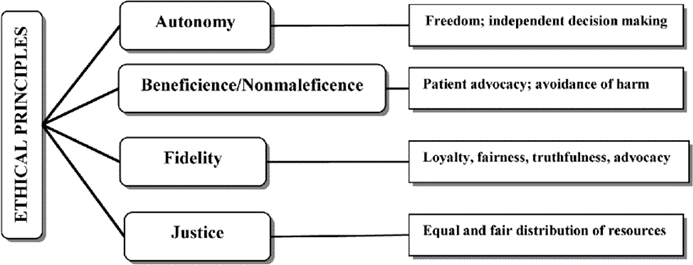A nurse is caring for a client who asks, "Can I decide not to continue with chemotherapy?" The nurse responds, "This is your choice, and I'll support whatever decision you make."
The nurse's response is an example of which of the following ethical principles?
Autonomy
Beneficence
Nonmaleficence
Veracity
The Correct Answer is A
The nurse's response demonstrates respect for the client's autonomy, which is the principle of respecting the client's right to make decisions about their own healthcare. The nurse acknowledges the client's right to make a decision and offers support for whatever decision the client makes. Beneficence is the principle of doing good for the client, while nonmaleficence is the principle of avoiding harm. Veracity is the principle of telling the truth to the client, which is not necessarily demonstrated in this scenario.

Nursing Test Bank
Naxlex Comprehensive Predictor Exams
Related Questions
Correct Answer is B
Explanation
As a member of a faith-based community, a parish nurse's role is to promote the physical, emotional, and spiritual health of the community members. Stress management strategies are an important aspect of overall health, and teaching stress management techniques can help community members manage stress and improve their overall well-being.
Changing a negative pressure wound therapy dressing, offering primary care to uninsured members, and providing case management are all important healthcare interventions, but they are not appropriate activities for a faith-based community setting. These interventions are best provided in a healthcare facility, such as a hospital or clinic, by licensed healthcare providers.
Correct Answer is B
Explanation
This statement is appropriate because it is a recommended preventive health measure for women in this age group to detect any potential eye problems early on.
Option A is incorrect because the American Diabetes Association recommends that individuals over the age of 45 should have their fasting blood glucose level checked every 3 years, not every 6 years.
Option C is incorrect because the United States Preventive Services Task Force does not recommend routine hearing screening in adults who do not have any symptoms of hearing loss.
Option D is incorrect because the American Cancer Society recommends that individuals over the age of 50 should have a screening colonoscopy every 10 years or a fecal occult blood test every year, not every other year until the age of 74.
Whether you are a student looking to ace your exams or a practicing nurse seeking to enhance your expertise , our nursing education contents will empower you with the confidence and competence to make a difference in the lives of patients and become a respected leader in the healthcare field.
Visit Naxlex, invest in your future and unlock endless possibilities with our unparalleled nursing education contents today
Report Wrong Answer on the Current Question
Do you disagree with the answer? If yes, what is your expected answer? Explain.
Kindly be descriptive with the issue you are facing.
